Healthcare Facilities Honor Nurses Who Have Gone Above, Beyond
Nurses are the backbone of our healthcare system, caring for physical and mental health alike. Learn more about some of the outstanding nurses in Polk County, including insight into why they chose the profession and what it means to be a “good nurse.”
AdventHealth Heart of Florida: Kristina Jalaff
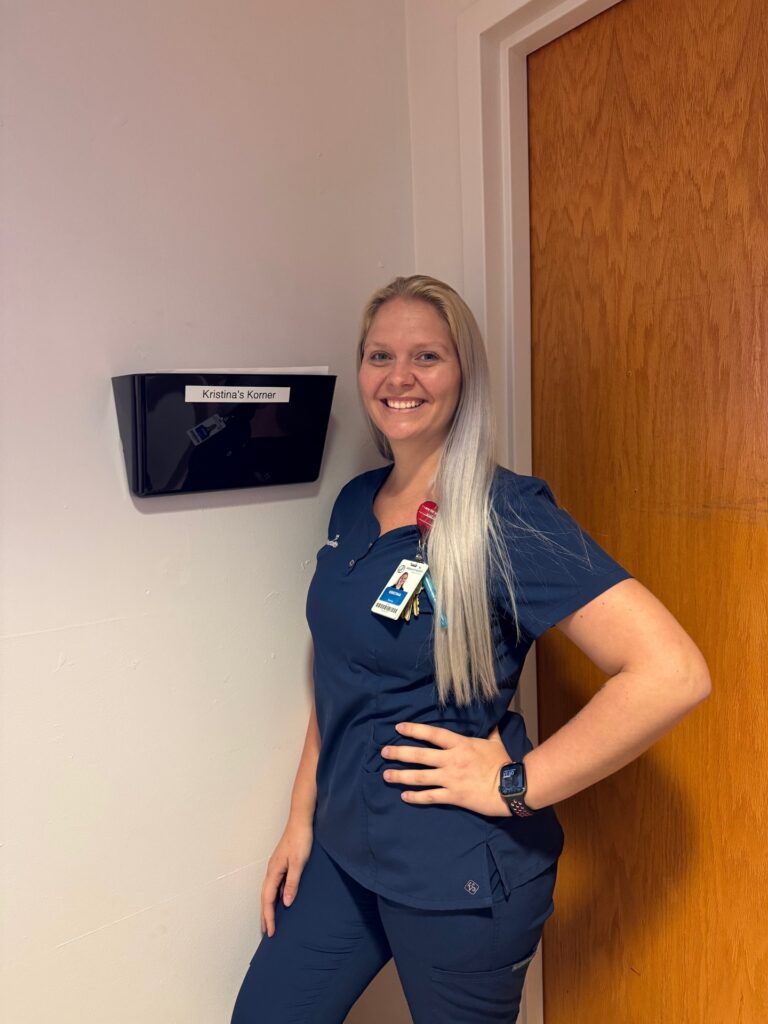
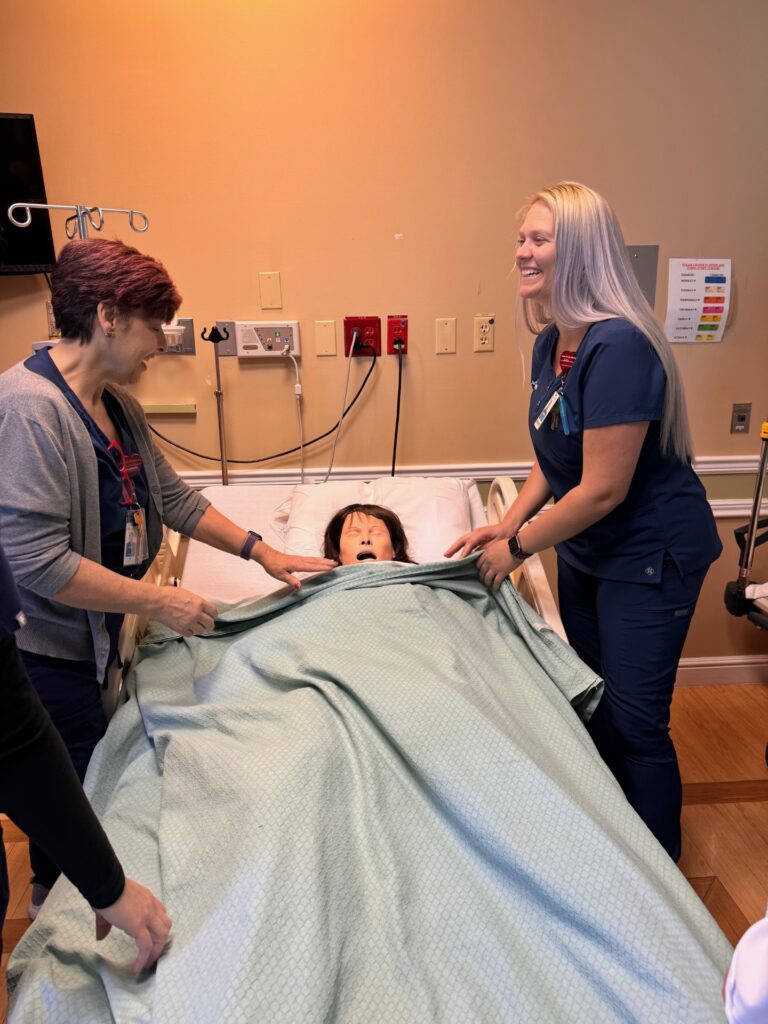
AdventHealth Heart of Florida clinic nurse educator Kristina Jalaff has received multiple nominations for the DAISY Award. Among her patient feedback are sentiments like:
“Kristina’s empathy and compassion kept my family from falling apart when we lost my mom, who was the most important person to so many people. Without her kindness and patience, this would have been even more catastrophic to me and my family. Words cannot express how thankful I am.”
CFHN: What does being a good nurse mean to you?
I think not only is knowledge base extremely important when it comes to being a good nurse, but my biggest thing is compassion. You can be a smart nurse, but if you’re not compassionate, your patients aren’t going to feel that. It’s why I went into nursing. I am a very compassionate person. And I treat all my patients and their families as if they were my family.
CFHN: Why did you decide to become a nurse?
Before I was a nurse, one of my aunts got really sick with brain cancer. I was taking care of her at home and when she was getting closer to passing, that’s when I kind of realized that I just truly loved taking care of her even when she was in her most vulnerable state. And so, when she did pass, that’s kind of what pushed me to become a nurse.
CFHN: What advice would you give someone who is considering a career in nursing?
It’s not easy. You have to be strong-hearted and strong-minded because of the hard days. Seeing these patients struggle, you need to be strong for those patients. You can’t crumble under the pressure.
CFHN: Can you share with us a specific memory or story from your career that is special to you?
I think probably one of my biggest ones is from during Covid. One of my travel assignments when I was in Texas, I was at a level one trauma and since I was a traveler, I was in the Covid ICU. I was caring for this patient. She was in her 20s and she came in and she was a known diabetic. She came in for an appointment and happened to just be Covid positive. Then when she was getting better with her diabetes, she ended up crashing because of Covid. I had her for about three weeks straight, because the contract that I was working at that time, I was working six days a week. So, I literally spent 18 days with this specific patient. Families were not being allowed to come into the hospital at this time. I was truly feeling bad for the family, so I was FaceTiming with the family almost every day that this patient was critical in the ICU, that way the family could still see their daughter and just see the kind of state that she was in because it wasn’t good. She was really critical. I got exceptions for her mother and father to come visit her in the ICU when we weren’t allowing any visitors. I was able to get them to come in twice with special approval. After my contract was done there, the family continued following up with me like through text, sending me updates on how she was doing. The very last message I got [said] the patient not only successfully came off the ventilator, she successfully was able to stop dialysis. They had sent me a video of the very first time she was able to walk outside of her house. So it was like me crying on the phone with her mom at this patient’s worst moments, to be able to see this patient not only singing but even walking even if it was with a walker. It was just amazing, and that family was truly amazing.
CFHN: As a nurse, how do you gauge your success and impact on patients? What does a job well done look like?
When I’m caring for patients [and] they genuinely say thank you. I feel like I’ve done my job, not only as a nurse, but just as a human being. It’s that wholecare experience we have at AdventHealth. Yes, I need to take care of myself, but I also need to make sure I’m taking care of patients, as well as patients’ families.
Bond Clinic: Brittany Toops, LPN
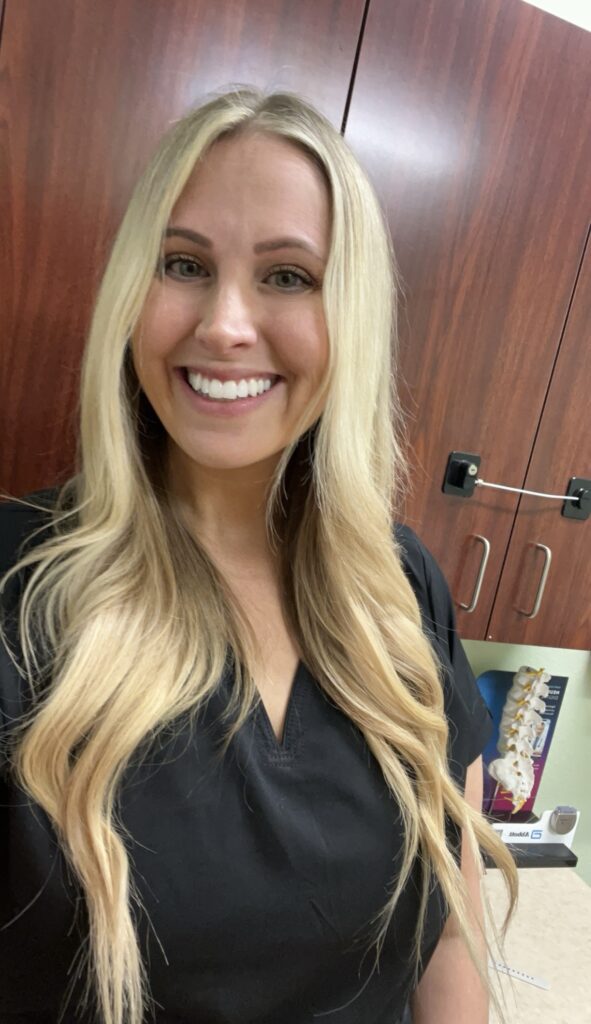
CFHN: What does a good nurse mean to you?
Someone who cares and who has compassion for people in need. Someone who stands up for their patients and shows empathy. It also means being a good team player and always striving to learn more about their field.
CFHN: Why did you decide to become a nurse?
Since I was little, it was always a dream of mine to become a nurse. I love taking care of people and feeling like I made a positive difference in their life. It always seemed like being a nurse was one of the best ways that I could accomplish that, so I made the decision to go for it and enter the nursing field. It was the best decision I ever made, and I enjoy what I do every day.
CFHN: What advice would you give someone who is considering a career in nursing?
Nursing is a wonderful and rewarding career, but it is demanding so you must be dedicated to your craft and willing to put in the time and hard work. You must have a love for people and show patience because you don’t always know what your patient is going through.
CFHN: Can you share with us a specific memory or story from your career that is special to you?
While working as a nurse in gynecology we had patients come in for their routine mammogram screenings to check for breast cancer. Unfortunately, sometimes the screenings would show cancer, which was always a sad situation. There was one patient that I became close with that was diagnosed with breast cancer and had to undergo surgery to remove the cancer. She was very emotional during the process and during that vulnerable time I made sure to reassure her that her body image was not as she saw it, and that she was still just as beautiful now as she was before the surgery. Sometimes my job as a nurse is not to handle just the nursing tasks, but to be there emotionally for our patients in their time of need.
CFHN: As a nurse, how do you gauge your success and impact on patients? What does your job well done look like?
I gauge my success and impact on patients when I know I have met their needs, and they leave happy. Getting a simple “thank you” from them goes a long way to let me know how I am doing. A job well done is having satisfied and happy patients who want to continue to come to our office for their healthcare needs!
Bond Clinic: Laura Kinchen, LPN
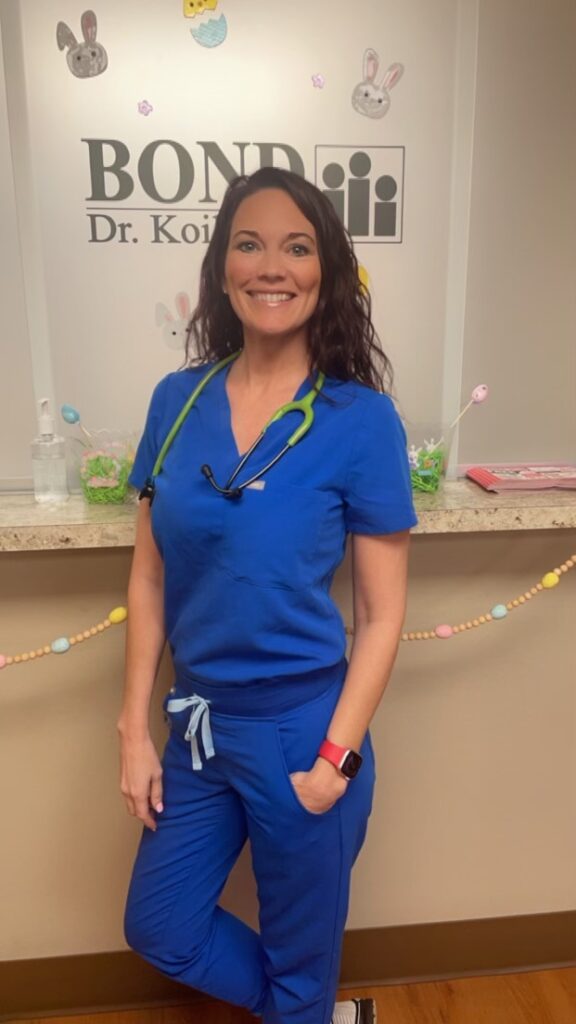
CFHN: What does a good nurse mean to you?
While knowledge can be acquired and skills can be learned, a good nurse is someone that has true care and compassion for their patient.
CFHN: CFHN: Why did you decide to become a nurse?
I decided to become a nurse when I realized I was truly at my happiest when I was helping others.
CFHN: What advice would you give someone who is considering a career in nursing?
The best advice I would give to anyone wanting to become a nurse is the same advice that was once given to me: Listen to your patient, be their advocate, and provide them with the same care and dignity you would want during your time of need.
CFHN: Can you share with us a specific memory or story from your career that is special to you?
I’ve had several memorable experiences in my nursing career, however, the most impactful moment occurred when I was still in nursing school. During my rotation in palliative care, I was assigned to a beautiful elderly lady near her final stages of life. I cared for her, bathed her, held her hand, and talked to her continuously. Even though she was past the point where she could verbally respond back to me, I felt she knew I was there. I helped her transition peacefully as she took her final breath.
CFHN: As a nurse, how do you gauge your success and impact on patients? What does your job well done look like?
As a nurse, that is still something I struggle with. I may never know the full impact I have had on a patient, but if they leave with a smile that wasn’t initially there, then I know I’ve done my job which in turn brings me joy.
Watson Clinic: Dana Hall, MBA, BSN, RN, Clinical Services Coordinator
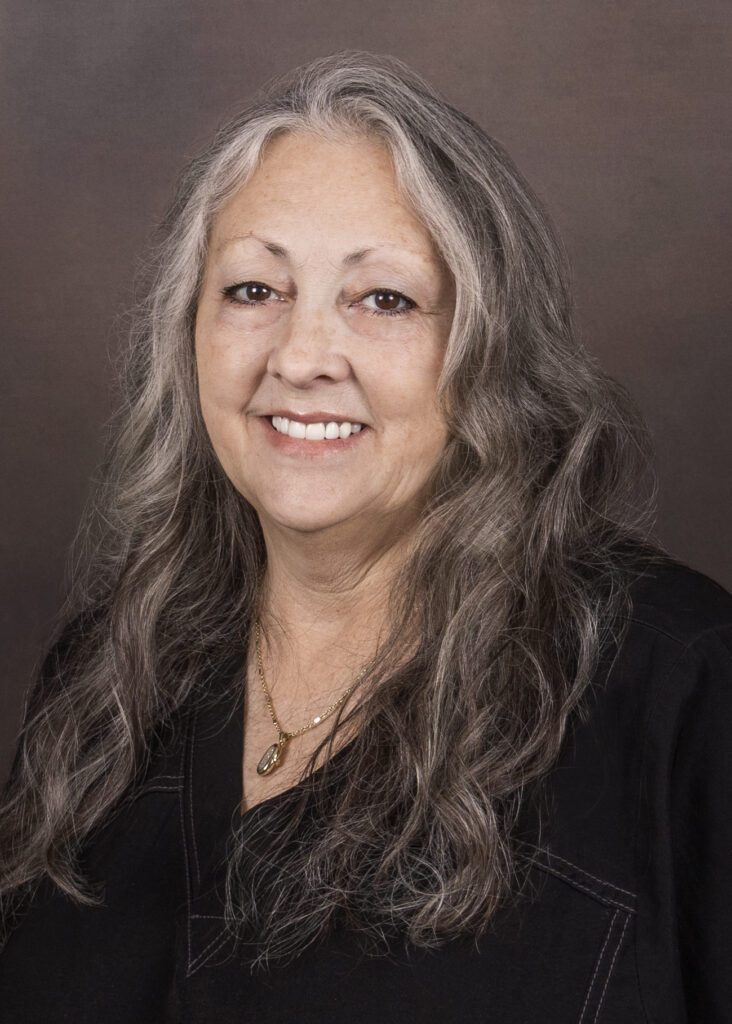
Cost of living increases have made it difficult for some nurses to afford the scrubs they need for work. Dana started an initiative called “Kindness Closet,” a program that accepts donations of new or lightly used scrubs for nursing colleagues in need. She received an overwhelming response from other nurses who were anxious to help their co-workers. Donations of freshly laundered new or like new scrubs and nursing shoes flooded her office. Dana has organized the donations by size in tubs and has given them away to many appreciative colleagues.
One of the main reasons why people go into nursing is the ability to help other people. Dana’s actions are a true demonstration of this principle. She works tirelessly to perform her job as a clinical coordinator and took this project on in addition to her regular workload.
— Clinic Services Director Heather Gordon
CFHN: What does being a good nurse mean to you? For me, it is a privilege to be able to provide comfort and care during some of the most difficult times in my patients’ lives. Sometimes being a good nurse is as simple as offering an empathetic ear, providing emotional support, and being their advocate. At other times, it’s providing the physical treatments, medications, and support they require to live another day.
Being a good nurse is seeing patients at their “worst” or “weakest” moments, and being their strength to make it through, or giving them the strength and comfort to let go. It can be an infinite number of things, but it is ALWAYS putting your patient first in everything you do, and even on our toughest days, remembering why we are here, and why we do what we do.
CFHN: Why did you decide to become a nurse? I think it probably started with my love of animals and caring for them as I was growing up. This eventually evolved into wanting to make a difference in the lives of others. It seemed very natural for me to pursue a career in nursing.
CFHN: What advice would you give someone who is considering a career in nursing? It is imperative that you are extremely honest with yourself. Ask yourself why you really want to be a nurse. If it is only for the money, and you don’t have a passion for caring for others, you will not be satisfied, and your patients will suffer because of your decision. Nursing is truly a work of the heart, and if your heart isn’t in it, it will show in your patient care.
CFHN: Can you share with us a specific memory or story from your career that is special to you? One of my most special memories was having a patient come back to the CVICU before leaving the hospital to say, “Thank you” for supporting him physically and emotionally after his acute myocardial infarction and cardiac arrest. He told me that when he went into cardiac arrest, he was surrounded by darkness, and could hear my voice, telling him to stay with me, and to keep fighting. Then after his open-heart surgery, he said that I had “encouraged” him to get up and walk four hours afterward, even though he gave me a million reasons why he couldn’t do it. He wanted me to know that I never gave up on him and he would forever be thankful.
CFHN: As a nurse, how do you gauge your success and impact on patients? What does a job well done look like? Personally, I believe that there is no better gauge of the impact my nursing practice has on the patient’s I serve than to see that my care has made a difference in their overall health and in their lives. Just seeing them smile, or hearing a simple “thank you,” is all I need to know that I am making a difference.
Winter Haven Hospital: Jubeth Arriesgado
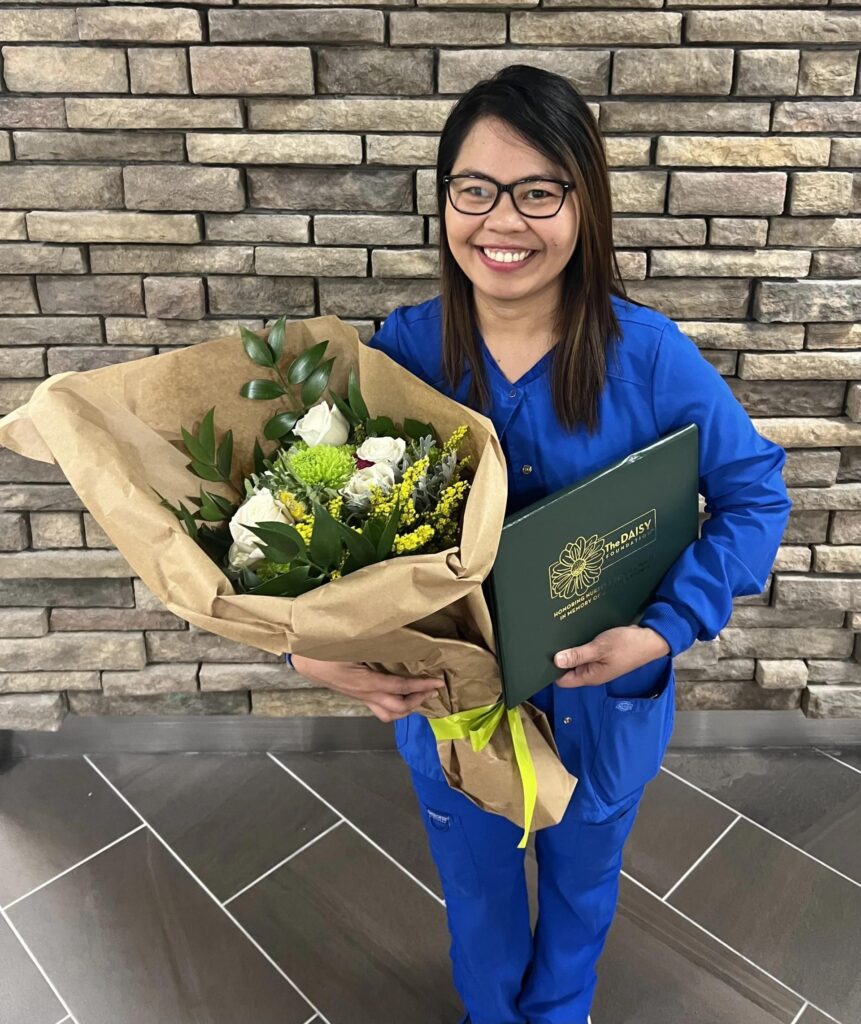
Jubeth is one of our newer nurses in the unit, and what an impact she has already made on the patients and in the unit! She is passionate, caring, sweet, knowledgeable, and takes the time to listen to her patients. Recently, Jubeth received a patient that desperately needed medical attention. Jubeth took the time to talk to the patient and explain what the patient had been through the past few days. Jubeth informed the patient she would continue to pray for them and hope they have success on their healing journey. Jubeth even wrote the patient a note and placed it in the room. Before Jubeth went home at the end of her shift she read the note to the patient and instantly they started crying. The patient was touched by this gesture, and it shows what impact the small gestures make in these patients.
— Corrine Graham (WHH Director of Patient Services)
CFHN: What does being a good nurse mean to you?
A good nurse is one who possesses virtuous attributes of character in her day-to-day care for her patients. She possesses inner strength and resilience under pressure. One of her most enduring qualities is patience and willingness to go the “second mile” in stressful situations. Throughout my nursing career, I strive to treat others as I would like to be treated – with kindness, compassion and honesty. Many of my patients come to me with concerns and are looking for a caretaker who can answer their questions candidly.
CFHN: Why did you decide to become a nurse?
My family strongly influenced me to be a healthcare worker as I am now. My parents were also healthcare workers. When I was younger, we lived in a community where many people sought medical advice from us. It has been my passion to become a missionary nurse so that I can serve others through the healing ministry of Christ, fueled by a need to provide loving medical relief to the underprivileged and less fortunate. I have been working in WHH for about a year now.
CFHN: What advice would you give someone who is considering a career in nursing?
Nursing is more than just a job. It is a calling and a vocation. As a nurse, you should always be willing to go the extra mile. You should accept the help and advice of experienced professionals and make it a habit to do extra research, thus becoming more familiar with the latest medical journals pertaining to your specialty. These are habits that are essential in being well-prepared for any contingency that may arise during your daily rounds.
Being a nurse will allow you to truly make a difference in someone’s life. You may not remember all the lives you uplifted, but those people you’ve touched will remember the care and compassion you provided to them.
CFHN: Can you share with us a specific memory or story from your career that is special to you? There was a time when I had the opportunity to take care of a patient who was restless, agitated, and often confused. Each shift, I had this routine of singing and praying with my patients. On my first night of caring for this patient, I was hanging the IV antibiotic while humming a song, “It Is Well.” When the patient heard me singing, he became calm and then rested the entire night. On the following day, I serenaded him again because it was his birthday. At this time, he was more alert and oriented. Upon returning to work on my second night, the patient opened up and started sharing more with me regarding his life. He had told me that after his divorce his life was never the same. After hearing his story, I offered to sing and pray for him. He was very thankful and his eyes filled with tears.
On my third night, he started asking me some questions and we had many conversations about faith. I told him about my church. Just before he was discharged, he asked me to come back to his room. He then told me how thankful he was for taking good care of him and that he looked forward to seeing me in church. Six weeks later, I remember being on stage singing when I saw this man seated in the middle pew. I immediately recognized that he was my patient whom I cared for a few weeks ago. At the end of the service, he approached me and said, ‘Do you still remember me?’ I could hardly contain my excitement when I told him, “Yes, of course. I do remember you. In fact, I am extremely happy to see you here today.” We hugged and he thanked me.
This particular experience stands out as the one of the most memorable stories in my nursing career. It allowed me the opportunity to not only use my singing skills, but to impact the life of another person.
CFHN: As a nurse, how do you gauge your success and impact on patients? What does a job well done look like?
One of the most gratifying aspects of being a nurse is being able to see your patient recover from an illness. As a critical care nurse, I often deal with critically ill patients where much attention and monitoring is required. Some of them will eventually recover, and some may worsen. However, it is rewarding to see my patients regain their health, and to see the joy on their faces when they are ready to go home.
A job well-done for me is when after long hours of working, to hear your patient tell you how appreciative and thankful they are for the care and compassion I have shown to them.
Bartow Regional Medical Center: Kaitlon Crum
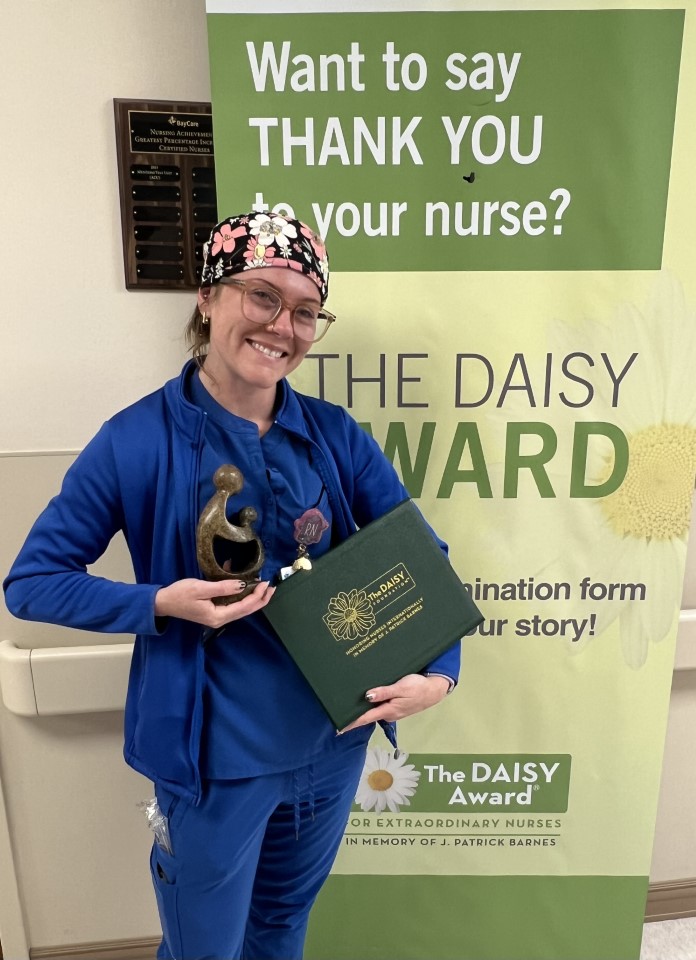
“Kaitlon stops at nothing to make sure her patients know they are cared for. Recently, she had a patient who was confined to their bed due to their condition, but they wanted to get out into the sun. Knowing this, Kaitlon brought the patient a sunflower to keep with them.”
— Kellie Dawson, Director of Patient Services, BRMC
CFHN: What does being a good nurse mean to you?
Personally, being a good nurse means you’re dedicated to keep going. You never stop learning and improving your knowledge base or skills to provide the best care possible to your patients. A good nurse establishes trust with their patients. I believe the best way to achieve trust is to listen to them. Let them know you understand what they are saying and then take the time to provide care in a way they understand.
CFHN: Why did you decide to become a nurse?
Nursing is a profession where you can actually apply years of science and research directly to your community for its benefit. As a nurse you get to the helping hands for those in need with the latest in today’s advancements in technology.
CFHN: What advice would you give someone who is considering a career in nursing?
There is no one type of nursing! There are limitless opportunities that this career can open for you. If you’re interested in a number of different specialties I highly recommend shadowing in various departments.
CFHN: Can you share with us a specific memory or story from your career that is special to you?
I have lots of moments that I often think about. One is of a young man who was a quadriplegic from being a victim of a school shooting. His story of running into his shooter years later and forgiving him for irreversible effects of his actions stayed with me. Or holding hands with a 93-year-old patient who had recently lost his wife and sang “For The Good Times” by Ray Price to me, then told me their great love story over the decades of their lives. Or sharing hugs of joy as I give the news to a patient that she got to go home to see her newest granddaughter the day she was born! Every patient may not remember our name or exactly what we said, but they will always remember how we made them feel being in our care.
CFHN: As a nurse, how do you gauge your success and impact on patients? What does a job well done look like?
Establishing trust with your patient is very important. Communication is the best way I build trust with them. You do this by making them feel part of their plan of care and make expectations clear. Being in the hospital is very stressful and can be scary when patients feel left in the unknown. Giving them that sense of grounding and involvement in what’s going on, I believe, leads to better outcomes and continuation of care.
Winter Haven Women’s Hospital: Angela Woelk
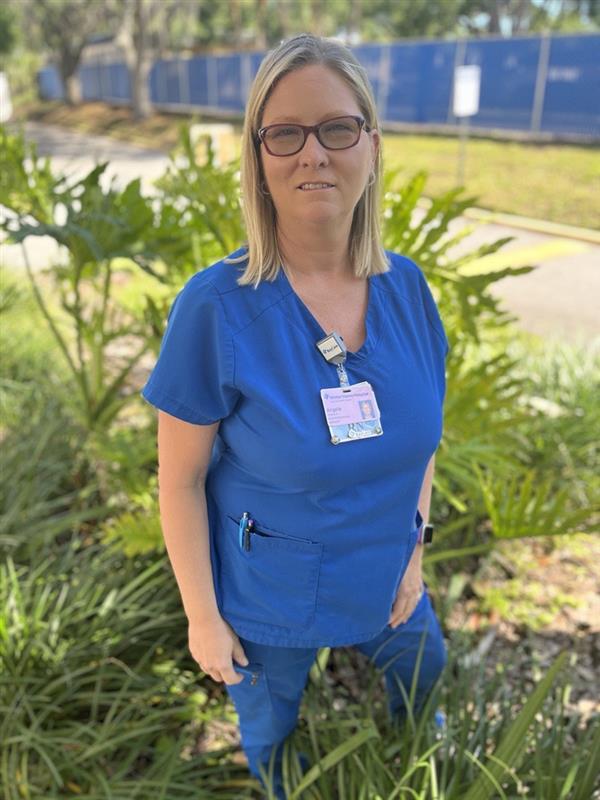
Angela is the prime example of an extraordinary nurse, and individual. She is a dedicated employee of 23 years with Winter Haven Women’s Hospital-BayCare, providing excellent care and service to our patients in the Neonatal Intensive Care Unit. Her leadership team and peers continuously notice her growth within the profession of nursing as well as her position. Angela currently serves as one of the charge nurses in the Neonatal Intensive Care Unit, not only providing expertise knowledge and care to the littlest of patients, but she strives to grow her team to achieve one main goal together, which is to provide the safest and greatest quality of care to all our patients here at Winter Haven Women’s Hospital. Angela currently holds her Bachelor of Science in nursing as well as her certification in her specialty of care as a certified registered nurse in neonatal intensive care. She is one of the Winter Haven Women’s chairs for the Professional Practice Council, a team that defines the parameters and key functions of practice for the nursing division. Throughout BayCare we are known for our values of trust, dignity, respect, responsibility and excellence. Angela is a superior example of those values not only professionally, but personally. We here at Winter Haven Women’s are thankful to have her a part of our team where we are able to practice alongside with Angela serving the women and infants of our community.
— Nicci Lambert (WHWH Director of Patient Services) and Valerie Butler (Labor & Delivery Nurse Manager at WHWH)
CFHN: What does being a good nurse mean to you?
Being a good nurse means that I get out of bed and leave my problems at home. I believe coming to work with a positive attitude and a cheerful disposition is the best way to start my shift and hopefully encourage others to do the same. I believe every nurse should try to treat every patient with dignity and compassion. A good nurse exhibits many qualities, such as critical thinking, communicating, and great time management skills. My best days are days when I go home knowing I made a difference in someone else’s life.
CFHN: Why did you decide to become a nurse?
I have been a nurse for 23 years. I started my career at Winter Haven Women’s Hospital in the Neonatal Intensive Care Unit where I plan to work until I retire. When I decided to become a nurse, I had delivered my first son and thought, ‘Wow this nurse has the best job ever!’ And I still feel that way. There is so much joy in being a part of this miracle that women go through to bring life into the world, and I get to share this with them.
CFHN: What advice would you give someone who is considering a career in nursing? If I were asked to give advice on going into nursing, I would tell them to give it a try, don’t get discouraged and don’t give up. I changed my mind several times on what area of nursing I wanted to work in while I was attending school. I didn’t choose NICU until I graduated. The nice thing about nursing is that your options are endless, you can change the area you work in, the facility you work for, or the shift you work, until you find the area best for you. There are also always chances for advancement in your career.
CFHN: Can you share with us a specific memory or story from your career that is special to you?
I have so many special memories, and so many special families that I have met over the years. There is one little boy that I will never forget, he was born at 29 weeks’ gestation to a surrogate. His parents lived in France and had to stay in a hotel in Winter Haven for close to two months. They came in to do skin-to-skin and help with his growth and development every day. It was a long road from a tiny 2-pound baby on a ventilator to a 5-pound baby ready to make the trip home to France.
CFHN: As a nurse, how do you gauge your success and impact on patients? What does a job well done look like?
The best part of my job is when parents say thank you. Sometimes they verbalize they appreciate me, sometimes they bring food, and sometimes it’s just the smile on their face that tells me I made a difference in their lives.
Winter Haven Hospital: Emily Flowers
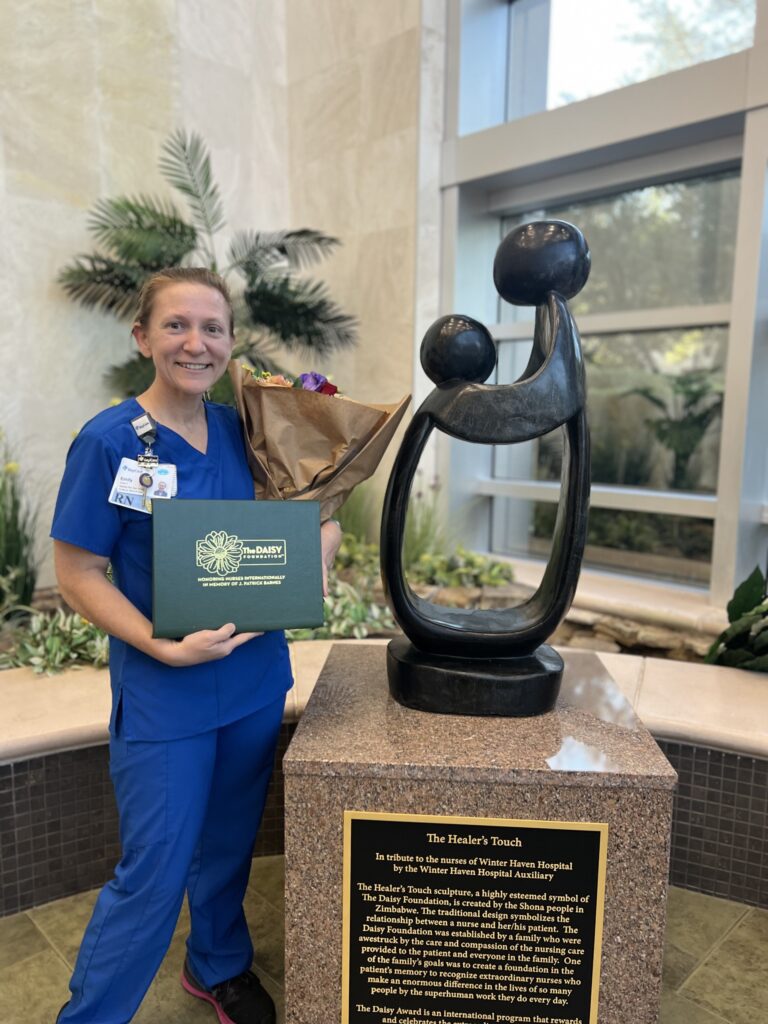
Besides being an amazing educator and human being, Emily Flowers is an incredible violin player. Emily consistently uses her gifts for the betterment of patients and team members alike. In June 2023, she shared her talent with the entire hospital while rounding during a nursing survey, playing for multiple hours and bringing joy to everyone who heard it. During this time, she was stopped by a patient’s son while rounding in the ICU. The gentleman requested Emily to play a song of her choice for his 91-year-old mother. She joyfully obliged and played as the patient delightfully listened. Emily uses her gift of music to spread light and hope to patients and team members. She is a testament to the BayCare value of excellence. Her compassion and kindness in sharing her gift is invaluable.
— Corrine Graham (WHH Director of Patient Services)
CFHN: What does being a good nurse mean to you?
The concept of a “good nurse” involves diverse interpretations, depending on perspective. From a managerial standpoint, it may entail good time management, and adherence to schedules. Patients, on the other hand, may prioritize timely medication administration and warm blankets. Now, as an educator, timely completion of annual competences is a priority. However, I firmly believe that the essence of a good nurse lies in the ability to adapt and care for the needs of any patient in any given circumstance. A good nurse has the capacity to empathize deeply, sharing tears with the family of a patient who has succumbed to cancer, only to transition seamlessly into the next room to share in the joy of another family whose loved one is being discharged home. This versatility, coupled with compassion and resilience, defines the heart of nursing excellence.
CFHN: Why did you decide to become a nurse?
I don’t have a heartwarming story for why I chose nursing as a profession. When I was 6 years old, I told my parents I wanted to be a nurse. I loved the cute scrubs that the nurses at the pediatrician’s office wore and I wanted to be just like them. I am the second oldest of ten children, so caring for people came naturally to me. Despite this simple origin, I believe that nursing is my calling. I have worked at WHH for six years. I spent five years in Oncology Services (inpatient and outpatient infusion), and one year in clinical education.
CFHN: What advice would you give someone who is considering a career in nursing?
Having dedicated the last 15 years to nursing, I would highly recommend it as a career. It’s important to acknowledge that nursing requires a willingness to handle what some might consider “dirty work.” If this aspect isn’t appealing, exploring alternative career paths may be advisable. But before making a final decision, I encourage individuals to take opportunities to immerse themselves in the healthcare environment. Volunteer at hospitals, work as a patient care technician or certified nursing assistant (CNA) or engage in roles like patient transport or environmental services. These experiences will provide invaluable insights into the aspects of caregiving and will allow one to assess their capacity for compassion. Compassion is the cornerstone of nursing and is what will drive daily commitment to the profession.
CFHN: Can you share with us a specific memory or story from your career that is special to you? Early in my life, I made a definitive choice to pursue a career in nursing, although my passion for music also tugged at my heart during my college years. While I loved playing my violin and was fortunate to receive music scholarships, my ultimate path led me to nursing, but I kept music as a hobby. Several years ago, a colleague suggested I bring my violin during the week of Christmas to serenade patients undergoing cancer treatments. This idea quickly blossomed into a tradition eagerly anticipated by our patients year after year. One experience stands out vividly: Playing my violin at the bedside of one of our sweetest patients just hours before he transitioned to hospice care. Sharing that moment intertwining joy and sorrow with the patient and his beloved wife left a lasting impression on my heart that I will forever hold dear.
CFHN:. As a nurse, how do you gauge your success and impact on patients? What does a job well-done look like?
A successful nurse embodies a blend of essential qualities: unwavering compassion and care, clinical proficiency, and staunch advocacy for both patients and colleagues alike. Continual commitment to enhancing nursing practice through evidence-based methods is pivotal. This includes a willingness to implement necessary adjustments to provide optimal patient outcomes and deliver exceptional quality of care.
